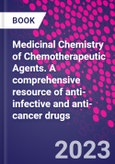Medicinal Chemistry of Chemotherapeutic Agents: A Comprehensive Resource of Anti-infective and Anti-cancer Drugs focuses on the basics and fundamentals of chemistry involved in chemotherapeutic agents. Each chapter comprises distinct chemical classifications that include structure and IUPAC nomenclature, synthetic schemes and routes for each drug, mechanism of the drug action, metabolic pathway and structure-activity relationship (SAR) studies. The book covers current research focused on drug resistance and methods to overcome it, the development of newer drugs belonging to each category of the chemotherapeutic agents, molecules currently under clinical trials, and newly approved drugs, if any.
This book will be a valuable resource for academics and researchers, helping them to understand the fundamentals of the medicinal chemistry of the chemotherapeutic agents.
Please Note: This is an On Demand product, delivery may take up to 11 working days after payment has been received.
Table of Contents
1. Introduction to Chemotherapy: General and Clinical Considerations
Section A. ANTIMICROBIAL AGENTS
Unit I Antibacterial Agents
2. Sulfonamides, Quinolones, Antiseptics and Disinfectants
Unit II Antibacterial Antibiotics
3. Beta-Lactam Antibiotics: Penicillins, Cephalosporins, Monobactams, Carbapenems and Beta-lactamase Inhibitors
4. Tetracyclines and Chloramphenicol
5. Aminoglycoside Antibiotics
6. Macrolide, Lincosamide, Glycopeptide and Other Antibacterial Antibiotics
Unit III Antimycobacterial Agents
7. Antitubercular Drugs
8. Antileprotic Drugs
Unit IV Antifungal Agents
9. Topical and Systemic Antifungal Drugs
Unit V Antiviral Agents
10. Antiviral Drugs and Vaccines
Unit VI Antiprotozoal Agents
11. Antimalarial Drugs
12. Antiamoebic Drugs
13. Drugs for Giardiasis, Trichomoniasis and Leishmaniasis
UNIT VII Anthelmintics
14. Vermifuge and Vermicide Drugs
Section B ANTINEOPLASTIC AGENTS
15. Synthetic Cytotoxic Drugs as Cancer Chemotherapeutic Agents
16. Naturally Occurring Anticancer Cytotoxic Drugs
17. Hormones and Antihormones in Cancer Chemotherapy
18. Biologicals and Small Molecules as Target Specific Cancer Chemotherapeutic Agents
Authors
Pratap Chandra Acharya Assistant Professor, Pharmaceutical Chemistry at the Department of Pharmacy, Tripura University (A Central University), Suryamaninagar, Tripura (W), India. Dr Pratap Chandra Acharya is presently working as Assistant Professor of Pharmaceutical Chemistry at the Department of Pharmacy, Tripura University (A Central University), Suryamaninagar, Tripura (W) India. He received his PhD in Pharmaceutical Chemistry from Panjab University, Chandigarh and M.Pharm (Pharmaceutical Chemistry) from IIT (BHU), Varanasi, India.He has more than 10 years of teaching and research experience in the field of pharmaceutical chemistry. He has been the member of various learned academic bodies such as IUPAC and APTI and has served as a reviewer to several international journals. His current research work involves various drug discovery projects for the development of anticancer drug candidates especially for colon cancer. Michio Kurosu Professor, Pharmaceutical Science, University of Tennessee Health Science Center (UTHSC), USA. Michio Kurosu has completed his Ph.D. from Osaka University, Japan and postdoctoral studies from Harvard University, Chemistry and Chemical Biology. He is a Professor of Pharmaceutical Science at University of Tennessee Health Science Center (UTHSC), USA. He has been teaching medicinal chemistry courses for pharmacy and Ph. D. students at UTHSC. He has a long-term interest in identifying new drug targets for bacterial infections and cancer chemotherapeutics. His research includes antibacterial and anticancer drug discoveries associated with Gram-negative bacteria, Mycobacterium spp., spore-forming bacteria (e.g. Clostridioides difficile), and solid cancers (e.g., pancreatic, breast, and ovarian cancers). As principal investigator on several NIH- and internally-funded programs, he has studied essential enzymes for growth of Acinetobacter baumannii, Klebsiella pneumoniae, and Mycobacterium tuberculosis, and glycosyl transferases for pancreatic and cervical cancers. He has been serving as editorial board members of several international journals and scientific reviewers of the NIH study sections.








